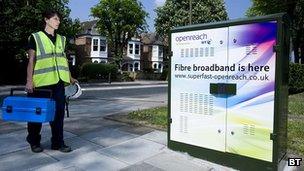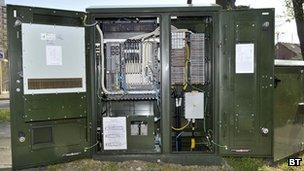UK broadband aided by planning permission rule changes
- Published

The news is designed to make it easier for network providers to install broadband cabinets
The government is changing planning permission rules to aid the rollout of faster internet speeds across the UK.
This includes permission for firms to install broadband cabinets and other related infrastructure on public land without local councils' permission in England.
It is also consulting about ways to shorten the time it takes to agree approval for cables and cabinet installation on private land UK-wide.
It builds on a previous £680m pledge.
The commitment includes £150m to create 10 "super-connected" cities offering download speeds of at least 80Mbps (megabits per second) by 2015, and £530m from the BBC licence fee to help boost speeds in the countryside.
The overall aim is to offer speeds of at least 24Mbps to more than 90% of the UK to become the "fastest in Europe" within three years.
At that speed it would take 15 minutes to download a 90-minute high definition programme via iPlayer.
Bypassing councils
Culture Secretary Maria Miller described the latest moves as "sweeping away the red tape" that would otherwise hold the country back.
Culture Secretary Maria Miller: plans are vital to "kick-start the economy"
They are designed to make it easier for BT and others to install 1.4m (4ft 7in) tall cabinets, and retrofit existing ones with new outer shells without running the risk that they will be opposed by the public.
The government said that English councils would only retain the right to object if plans affected a site of special scientific interest.
Internet providers have also been told that they will "face less cost and bureaucracy in laying cables in streets" in England and Wales once officials have found a way to simplify current permit schemes.
Planning row
BT ran into problems earlier this year when London's Royal Borough of Kensington and Chelsea rejected 96 of its 108 applications for street cabinets needed to offer its fibre optic cabling service, leading to the plans being withdrawn.
"BT is already rolling out fibre broadband at record pace but there are a variety of issues that can sometimes slow us down and cause frustration for those consumers and businesses who are keen to get fibre broadband," a spokesman said.
"We are pleased that the government acknowledges those barriers and also that they share our ambition that as many people as possible can benefit from the high speed fibre revolution."

BT said it typically took between 28 and 56 days to be granted council permission to install its cabinets
Virgin Media also welcomed the move, but added that it thought the steps were "overdue".
That view was supported by the editor of the Thinkbroadband news site.
"If this announcement had been made in 2010, when firms were getting under way to make bids for BDUK work, then we may have actually had more firms left in the final bidding, rather than the choice of just two, BT and Fujitsu," said Andrew Ferguson.
"While these rule changes will affect [BT's] Openreach most, they will also benefit others like C&W, Hyperoptic, Geo, FibreCity, Virgin Media and other operators who are rolling out fibre.
"The question really is whether a backlash to a new range of street furniture in the market towns will result."
- Published5 September 2012
- Published20 August 2012
- Published21 March 2012